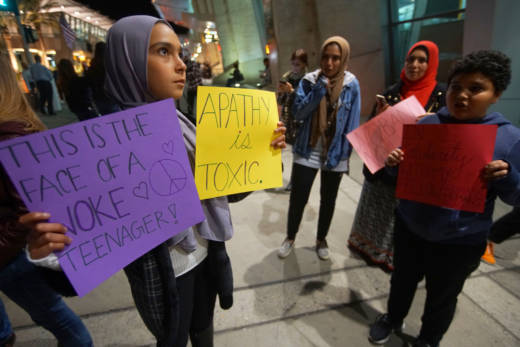"If you look at the countries that are listed with the new restrictions, a majority of them are Muslim-majority countries," said Farida Chehata, managing attorney for immigrant rights with the Council on American-Islamic Relations in Anaheim.
"There are two countries that are obviously not Muslim-majority, and those are North Korea and Venezuela. However, when you look at the restrictions that are placed on them, it clearly indicates that this is still a Muslim ban," she said. Those impacted from North Korea and Venezuela "are very minimal."
Sunday's presidential proclamation suspends immigrant visas for a limited number of Venezuelans, namely government officials and their families. But for the other countries, all immigrant visas are suspended. This includes North Korea, which also will have its non-immigrant travel suspended as well.
North Korea has very strict exit policies. Relatively few North Koreans make it to the United States each year, as immigrants or visitors. According to federal data, the U.S. issued only 55 green cards in 2015, for example, to people born in North Korea.
Chehata said her organization is looking into challenging the latest rules.
Those who side with the Trump administration in its effort to restrict travel from certain countries say the latest limits are not about religion.
“The countries that are on the list, they pose a threat to the national security of the United States, for different reasons," said Peter Núñez, a former U.S. attorney in San Diego and an immigration restriction advocate.
"We did not let Germans come to the United States during the Second World War," Núñez said. "We did not let the Japanese immigrate or enter the United States during the Second World War. We restricted and limited immigration from the Soviet Union, and Red China, and that was never questioned."
Meanwhile, the U.S. Supreme Court has put off hearing arguments on two cases questioning the legality of Trump's travel ban. Arguments were set to be heard next month.
Both sides have been ordered to file new briefs on whether parts of the legal challenges are moot in light of the latest restrictions.
Ahilan Arulanantham, legal director for the American Civil Liberties Union of Southern California, said the legal challenge of the ban by plaintiffs, including two states, could go in a few different directions.
"It could conceivably get kicked back to the lower courts that had decided the cases that are before the Supreme Court now, which would be Hawaii and Maryland," he said. "Or depending on what the court rules, if the court rules that it is actually moot, then it would require people to bring separate challenges to this order, which we are prepared to do."
